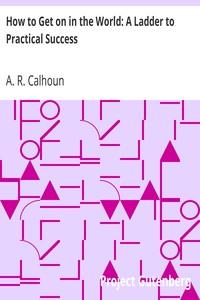|
|
Read this ebook for free! No credit card needed, absolutely nothing to pay.Words: 9829 in 3 pages
This is an ebook sharing website. You can read the uploaded ebooks for free here. No credit cards needed, nothing to pay. If you want to own a digital copy of the ebook, or want to read offline with your favorite ebook-reader, then you can choose to buy and download the ebook.

: How to Get on in the World: A Ladder to Practical Success by Calhoun A R Alfred Rochefort - Success@FreeBooksTue 06 Jun, 2023 he had scarcely entered manhood ere his constitution began to exhibit signs of disease. As early, indeed, as his seventeenth year, he began to complain of melancholy and sleeplessness, supposed to be the effects of bile. "I don't think I shall live long," he then said to a friend; "my mind will--must work itself out, and the body will soon follow it." A strange confession for a boy to make! But he gave his physical health no fair chance. His life was all brain work, study, and competition. When he took exercise it was in sudden bursts, which did him more harm than good. Long walks in the Highlands jaded and exhausted him; and he returned to his brain-work unrested and unrefreshed. It was during one of his forced walks of some twenty-four miles, in the neighborhood of Stirling, that he injured one of his feet, and he returned home seriously ill. The result was an abscess, disease of the ankle-joint, and a long agony, which ended in the amputation of the right foot. But he never relaxed in his labors. He was now writing, lecturing and teaching chemistry. Rheumatism and acute inflammation of the eye next attacked him, and were treated by cupping, blistering, and colchicum. Unable himself to write, he went on preparing his lectures, which he dictated to his sister. Pain haunted him day and night, and sleep was only forced by morphia. While in this state of general prostration symptoms of pulmonary disease began to show themselves. Yet he continued to give the weekly lectures to which he stood committed to the Edinburgh School of Arts. Not one was shirked, though their delivery, before a large audience, was a most exhausting duty. "Well, there's another nail put into my coffin," was the remark made on throwing off his top-coat on returning home; and a sleepless night almost invariably followed. At twenty-seven, Wilson was lecturing ten, eleven, or more hours weekly, usually with setons or open blister-wounds upon him--his "bosom friends," he used to call them. He felt the shadow of death upon him, and he worked as if his days were numbered. "Don't be surprised," he wrote to a friend, "if any morning at breakfast you hear that I am gone." But while he said so, he did not in the least degree indulge in the feeling of sickly sentimentality. He worked on as cheerfully and hopefully as if in the very fullness of strength. "To none," said he, "is life so sweet as to those who have lost all fear of dying." Sometimes he was compelled to desist from his labors by sheer debility, occasioned by loss of blood from the lungs; but after a few weeks' rest and change of air, he would return to his work, saying, "The water is rising in the well again!" Though disease had fastened on his lungs, and was spreading there, and though suffering from a distressing cough, he went on lecturing as usual. To add to his troubles, when one day endeavoring to recover himself from a stumble occasioned by his lameness, he overstrained his arm, and broke the bone near the shoulder. But he recovered from his successive accidents and illnesses in the most extraordinary way. The reed bent, but did not break; the storm passed, and it stood erect as before. There was no worry, nor fever, nor fret about him; but instead, cheerfulness, patience and unfailing perseverance. His mind, amidst all his sufferings, remained perfectly calm and serene. He went about his daily work with an apparently charmed life, as if he had the strength of many men in him. Yet all the while he knew he was dying, his chief anxiety being to conceal his state from those about him at home, to whom the knowledge of his actual condition would have been inexpressibly distressing. "I am cheerful among strangers," he said, "and try to live day by day as a dying man." He went on teaching as before--lecturing to the Architectural Institutes and to the School of Arts. One day, after a lecture before the latter institute, he lay down to rest, and was shortly awakened by the rupture of a blood-vessel, which occasioned him the loss of a considerable quantity of blood. He did not experience the despair and agony that Keats did on a like occasion, though he equally knew that the messenger of death had come, and was waiting for him. He appeared at the family meals as usual, and next day he lectured twice, punctually fulfilling his engagements; but the exertion of speaking was followed by a second attack of hemorrhage. He now became seriously ill, and it was doubted whether he would survive the night. But he did survive; and during his convalescence he was appointed to an important public office--that of director of the Scottish Industrial Museum, which involved a great amount of labor, as well as lecturing, in his capacity of professor of technology, which he held in connection with the office. From this time forward, his "dear museum," as he called it, absorbed all his surplus energies. While busily occupied in collecting models and specimens for the museum, he filled up his odds-and-ends of time in lecturing in Ragged Schools and Medical Missionary Societies. He gave himself no rest, either of mind or body; and "to die working" was the fate he envied. His mind would not give in, but his poor body was forced to yield, and a sever attack of hemorrhage--bleeding from both lungs and stomach--compelled him to relax in his labors. "For a month, or some forty days," he wrote--"a dreadful Lent--the wind has blown geographically from 'Araby the blest,' but thermometrically from Iceland the accursed. I have been made a prisoner of war, hit by an icicle in the lungs, and have shivered and burned alternately for a large portion of the last month, and spat blood till I grew pale with coughing. Now I am better, and to-morrow I give my concluding lecture , thankful that I have contrived, notwithstanding all my troubles, to early on without missing a lecture to the last day of the Faculty of Arts, to which I belong." How long was it to last? He himself began to wonder, for he had long felt his life as if ebbing away. At length he became languid, weary, and unfit for work; even the writing of a letter cost him a painful effort, and he felt "as if to lie down and sleep were the only things worth doing." Yet shortly after, to help a Sunday school, he wrote his "Five Gateways of Knowledge," as a lecture, and afterward expanded it into a book. He also recovered strength sufficient to enable him to proceed with his lectures to the institutions to which he belonged, besides on various occasions undertaking to do other people's work. "I am looked upon as being as mad," he wrote to his brother, "because on a hasty notice, I took a defaulting lecturer's place at the Philosophical Institution, and discoursed on the polarization of light . . . But I like work: it is a family weakness." That was written only about four months before his death. A little later he wrote: "I spin my thread of life from week to week, rather than from year to year." Constant attacks of bleeding from the lungs sapped his little remaining strength, but did not altogether disable him from lecturing. He was amused by one of his friends proposing to put him under trustees for the purpose of looking after his health. But he would not be restrained from working so long as a vestige of strength remained. One day, in the autumn of 1859, he returned from his customary lecture in the University of Edinburgh with a severe pain in his side. He was scarcely able to crawl up stairs. Medical aid was sent for, and he was pronounced to be suffering from pleurisy and inflammation of the lungs. His enfeebled frame was ill able to resist so severe a disease, and he sank peacefully to the rest he so longed for, after a few days' illness. The life of George Wilson--so admirably and affectionately related by his sister--is probably one of the most marvelous records of pain and long-suffering, and yet of persistent, noble and useful work, that is to be found in the whole history of literature. Instances of this heroic quality of self-forgetfulness in the interest of others are more frequent than we realize. Dr. Louis Albert Banks mentions the following illustration: "The other day, in one of our cities, two small boys signaled a street-car. When the car stopped it was noticed that one boy was lame. With much solicitude the other boy helped the cripple aboard, and, after telling the conductor to go ahead, returned to the sidewalk. The lame boy braced himself up in his seat so that he could look out of the car window, and the other passengers observed that at intervals the little fellow would wave his hand and smile. Following the direction of his glances, the passengers saw the other boy running along the sidewalk, straining every muscle to keep up with the car. They watched his pantomime in silence for a few blocks, and then a gentleman asked the lame boy who the other boy was: 'My brother,' was the prompt reply. 'Why does he not ride with you in the car?' was the next question. 'Because he hasn't any money,' answered the lame boy, sorrowfully. But the little runner--running that his crippled brother might ride-- had a face in which sorrow had no part, only the gladness of a self- denying soul. O my brother, you who long to do great service for the King and reach life's noblest triumph, here is your picture--willing to run that the crippled lives may ride, willing to bear one another's burdens, and so fulfill the law of Christ--that is the spirit of the King's country." Free books android app tbrJar TBR JAR Read Free books online gutenberg More posts by @FreeBooks
: The Magic City by Nesbit E Edith Millar H R Harold Robert Illustrator - Fantasy literature Children's Fiction; Children's Literature@FreeBooksTue 06 Jun, 2023

: Christmas Short Works Collection 2006 by Various - Christmas stories; Christmas Christmas@FreeBooksTue 06 Jun, 2023
|
Terms of Use Stock Market News! © gutenberg.org.in2025 All Rights reserved.






